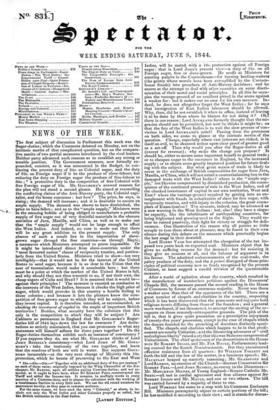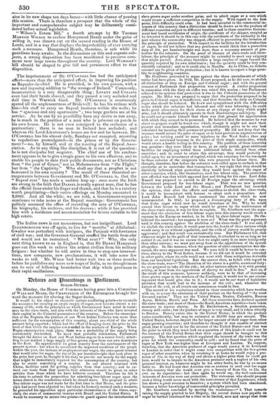NEWS OF THE WEEK.
The first subject of discussion in Parliament this week was the Sugar-duties; which the Commons debated on Monday, not on the intrinsic merits of that complicated question, but on the compara- tive merits of two partial measures introduced by the rival leaders. Neither party advanced such reasons as to establish any strong or tenable position. The Government measure, now formally ex- pounded, consists, as it was announced in the Budget, in con- tinuing the present duty of 248. on Colonial sugar, and the duty of 63s. on Foreign sugar if it be the produce of slave-labour, but reducing the duty on Foreign sugar the produce of free-labour to -348.; * a protective duty in the competition of free Colonial with free Foreign sugar of 10s. Mr. GOULBURN'S avowed reasons for the plan will not stand a second glance. He aimed at reconciling the conflicting claims of the Anti-Slavery party, the Colonial capi- talist, and the home consumer : but how ? The price, he says, is rising; the demand will increase ; and it is desirable to secure an ample supply. The demand was shown to have diminished, the rice to have fallen; and as to the "ample supply," Ministers were in the amusing hobble of being obliged to manufacture a probable supply of free sugar out of very doubtful materials in the obscure statistics of Java, Manilla, and China, as well as to make out that the "ample supply" would not be large enough to affect the West Indies. And indeed, no case is made out that there -will be any great addition to the present supply. The only chance of such a result lies in the importation of slave- grown sugar through the free countries—as through Hayti; a manceuvre which Ministers attempted to prove impossible. Or it might be introduced direct from slave-countries under the " most favoured nation" clause of reciprocity treaties, and particu- larly from the United States. Ministers tried to show—not very intelligibly—that it would not be for the interest of the United States to send sugar, because it is so dear in the Union that the cost of transmission would make it unsaleable here : but there must be a point at which the market of the United States is full, and why should they not then transmit to us, if not their own, the .cheap sugars of Cuba and Brazil ? It is assumed that it would be— against their principles I The measure is vaunted as conducive to the interests of the West Indies, because it checks the high price of sugar, which would provoke in this country a hostile feeling to those colonies ; and because it lets the planters know the com- petition of free-grown sugar to which they will be subject, before they invest capital. It is therefore intended, or recommended, as checking the investment of capital in the staple of important British territories ! Besides, what security have the colonists that this only is the competition to which they will be subject ? Are Cabinets so permanent in England that Mr. GOULBURN'S Sugar- duties bill of 1844 lays down the law for evermore ? Are decla- rations so strictly maintained, that you can pronounce to what any statesman will himself adhere for three years together ? Do the Sugar-duties themselves exhibit such an instance of consistency ? If you suppose they do, see what Mr. GouLeuart thinks of Lord JOHN RUSSELL'S consistency—what Lord Joux of Mr. Gout.- BURN'S : take the testimony of the two together, and learn that the resolves of both are writ in water. But suppose Gout: MEN inexorable—at the very next change of Ministry this 10s. protection, which he boasts of preserving to the East and West • 24s.-63s.---34s.—" Together with an additional duty of Ave per centum " on each of these rates; originally imposed by the Whig Chancellor of the Ex- chequer, Mr. BARING, upon all articles paying Customs-duties; and not re- moved, as it ought to have been, when Sir ROBERT PEEL reconstructed the Tariff and added the Inearne•taa. It remains, to multiply words in every mention of a Customs-duty, and to plague the calculator with the working of a troublesome fraction in every little sum. We use the old round numbers for convenient brevity, as they pass in common parlance. For the same reason, we have used the term " Colonial," as above, to in- clude not only the West Indies and other Colonies properly so called, but the British territories in the East lathes. Indies, will be mated with a 10s. protection against all Foreign sugar : that is Lord JOHN'S present view—a duty of' 34s. on all Foreign sugar, free or slave-grown. He scoffs at Ministers for erecting pulpits in the Customhouse—for turning landing-waiters (the gentry whose morals have been exemplified by the Custom- house frauds) into preachers of Anti-Slavery doctrines ; and he sneers at the attempt to deal with other countries on some discri- mination of their moral and social principles. In all this he occu- pies the vantage-ground of an assailant pitted in the arena against a weaker foe: but it makes out no case for his own measure. In- deed, he does not altogether forget the West Indies ; for he says that immigration of East Indian labourers should be allowed. Why, then, did he not establish it when in office, instead of leaving it to be done by those whom he blames for not doing it ? Oh: there is one reason : Lord AUCKLAND formerly thought that the mi- gration should not be permitted, but now he thinks it might be; so that the fate of the West Indies is to wait the slow process of con- viction in Lord AUCKLAND'S mind ! Passing from the pretences on both sides, we come to glance at the intrinsic merits of the question. Change, especially where vast interests are risked, is in itself an evil, to be shunned unless upon clear proof of greater good as a set-off. Then why would you alter the Sugar-duties at all (except for revenue) ; why make the change you propose? It should be, either to secure some important benefit to general trade; or to cheapen sugar to the consumer in England, by the increased. supply ; or to obtain some greatly improved position for future deal- ing with the subject. But what great access of trade is likely to occur in the exchange of British commodities for sugar from Java, Manilla, or China, which will not entail a counterbalancing loss in the damaged trade with the West Indies ? where is the "ample sup- ply," not likewise compensated by diminished production, the conse- quence of the continued process of ruin in the West Indies, and of the checked investment of capital in our own territories, West and East ? where the vantage-ground acquired by getting into an en- tanglement with frauds in substitution of slave for free sugar, with reciprocity treaties, and with injury to the colonies, the great exem- plars of Emancipation ? The measure, indeed, may be advanced as a new warning to the West Indians : but, alas ! they have a singu- lar capacity, like the inhabitants of earthquaking countries, for being frightened and growing used to the fright. They would ra- ther be ruined passively, than fight for victory or struggle for deli- verance. One illustration of the reason why all parties so little scruple to toss them about at pleasure, may be found in their own silence during this debate on the measure which practically begins the last stage in their downfall. Lord HARRY VANE has attempted the abrogation of the tax im- posed two years back on exported coal. Ministers object that he gives no sufficing reasons for the demand : but for resisting it they give no reasons at all, and the balance of argument is in his favour. The admitted embarrassments of the coal-trade, the paltry produce of the duty, and the a priori disregard of those prin- ciples of political economy now so freely recognized by the present Cabinet, at least suggest a candid revision of the questionable measure.
After a world of agitation about the country, which resulted in the manufacture of numberless petitions against the Dissenters? Chapels Bill, the measure passed the second reading in the House
of Commons by favour of an enormous majority. Never was there a weaker case than that of the opponents of' the bill. There are a
great number of chapels and charities in the country, respecting which it has been discovered that the possessors and enjoyers hold religious tenets differing from those of the founders ; and a general move was feared, if not threatened, to attempt the ousting of the oc- cupants on those remotely-retrospective grounds. The pith of the bill is, that it gives quiet possession on a prescriptive enjoyment of twenty-five years' possession, except in the case of chapels which the donors founded for the preaching of doctrines distinctly speci- fied. The chapels and charities which happen to be in that predi- cament are mostly Unitarian ; and the Dissenting advocates of" civil and religious liberty" raised a cry that this was State encouragement of Unitarianism. The chief spokesmen of the dissentients in the House
were Sir ROBERT INGLIS, and Mr. Fox MAULE, Parliamentary lead- ing counsel for the Scotch Nonintrusionists. But they encountered effective resistance from all quarters : Sir WILLIAM FOLLETT set
forth the bill and the law of the matter, in a luminous speech ; Mr_
Mac AULAY heaped up masterly reasoning ; Mr. GLADSTONE and Lord SANDON, no enemies of the Church—discreet Conservative Sir ROBERT PEEL—Lord JOHN RUSSELL, no enemy to the Dissenters— Mr. Moxesrox MILNES, of Young England—Roman Catholic Mr. SHEIL—all met in cordial agreement and firm alliance against Sir Ross= INGLIS and Mr. MAULE, and one or two others. The bill was carried forward by a majority of three to one. Lord WOBSLEY has come to a stop with his Commons Enclosure Bill. Ministers peremptorily object to certain portions of the bill; he has modified it according to their view ; and it stands for discus-
sion in its new shape ten days hence—with little chance of passing this session. There is therefore a prospect that the whole of the important and comprehensive subject may be deliberately consi- dered before actual legislation.
"Wilson's Estate Bill," a fourth attempt by Sir THOMAS MARTON Witsori to enclose Hampstead Heath under the guise of selling it, was thrown out on the second reading in the House of Lords, and in a way that displays the improbability of ever carrying such a measure. Hampstead Heath, therefore, is safe while its guardians keep awake. In the discussions on this and cognate sub- jects, a strong disposition has been manifested to preserve com- mons near large towns throughout the country. Lord WORSLEY'S bill should be shaped to give full and permanent effect to that disposition.



























